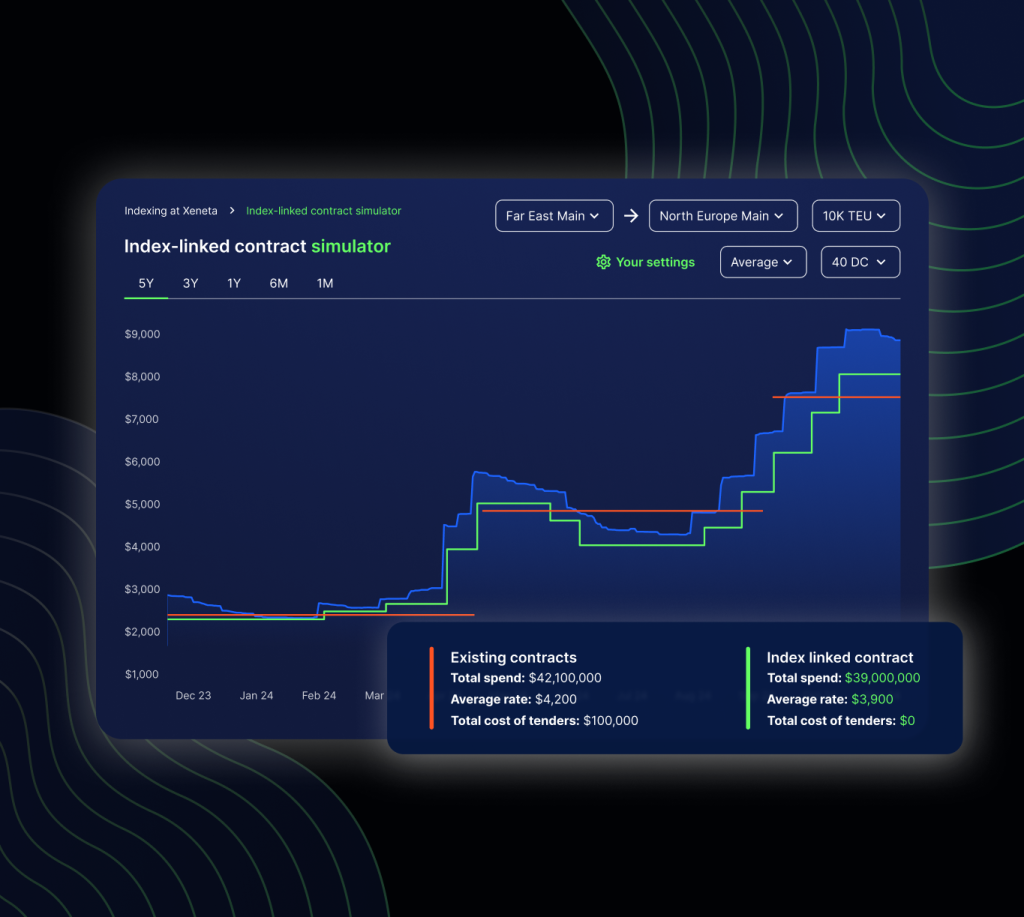Xeneta Wins Innovation Award for their Index-Linked Contract Simulator for managing Ocean Freight
The global ocean freight industry, responsible for nearly 90% of international trade, has long relied on fixed-rate contracts that often fail to keep pace with changing market conditions. Index-linked contracts can address these challenges by aligning freight rates more closely with actual market conditions, reducing risk for both shippers and carriers. However, they’ve been difficult to adopt and put into practice, and despite their benefits, they have yet to gain widespread acceptance.
Discover B2B Marketing That Performs
Combine business intelligence and editorial excellence to reach engaged professionals across 36 leading media platforms.
Advancing contracting practices in ocean freight

Fixed-rate agreements have been the standard in ocean freight contracting for decades, but they often leave both shippers and carriers exposed to significant financial risk when market rates fluctuate. During periods of global disruption, such as a pandemic or changing geopolitical events, shippers can end up overpaying for freight and face costly renegotiations, while carriers may struggle to maintain margins or fulfill contractual commitments. These breakdowns not only create financial inefficiencies but also erode trust and place additional strain on global supply chains.
Xeneta’s Index-Linked Contract Simulator addresses these challenges by enabling users to simulate how contracts would perform if they were linked to dynamic market indices rather than static rates. For example, a shipper can model a contract that adjusts quarterly based on a specific trade lane index, setting frequency, ceilings, floors and thresholds to manage risk. The simulator simplifies and standardizes index contract rules, providing a level of flexibility and customization previously unavailable in the industry.
The simulator integrates with Xeneta’s Index, derived from an extensive database of over 680 million short- and long-term contracted freight rates, ensuring that every scenario is grounded in real, auditable market data. This capability allows both shippers and carriers to back-test how different contract structures, such as index-linked agreements, would have performed over historical periods, and to compare these outcomes against their own historical rates. By providing actionable insights based on actual market data, the simulator empowers users to make more informed decisions about contract strategies and to assess the potential benefits of adopting index-linked contracting models on some of all of their routes, in today’s volatile shipping environment.
Accessible and intuitive contract simulation
One of the most significant barriers to adopting innovative contracting models in shipping has been the lack of a trusted, globally recognized index, the absence of a standardized contracting framework agreeable to both buyers and sellers, and a lack of familiarity with how index-linked agreements work. Xeneta’s simulator was designed with a user-first approach to drive greater collaboration and transparency between buyers and sellers of ocean freight contracts. By providing a visual, analytical platform that enables users to easily back-test and analyze contract scenarios, the tool supports more open, data-drivenn discussions and makes advanced contract simulation accessible to a broad audience.
Feedback from users highlights the value of the simulator, noting that it not only simplifies complex pricing logic, but also builds confidence in adopting new contracting models. This focus on clarity and empowerment has been instrumental in accelerating industry-wide adoption and lowering the entry barrier for companies of all sizes.
Measurable impact and industry modernization
The operational and strategic impact for customers using Xeneta’s Index-Linked Contract Simulator has been significant. Traditionally, running a full contract simulation or tender process could take from four to six months, requiring cross-functional teams and incurring costs estimated between $150,000 and $250,000. With Xeneta’s solution, users establish longer (2–3 year) contracts linked to dynamic market indices, eliminating annual tenders and frequent renegotiations—freeing up resources and enabling faster, more agile decision-making.
This dramatic reduction in time and cost has made sophisticated contract analysis accessible to a much wider range of companies, including those without large procurement teams or specialized analytical tools. Hundreds of customers, from regional shippers to global enterprises, have adopted the simulator to build internal business cases and help them successfully transition to live index-linked contracts. Procurement teams report greater confidence in negotiating market-aligned rates, while commercial teams use the simulator to foster transparency and strengthen relationships with partners.
Beyond immediate operational efficiencies, the simulator is establishing a new standard for data-driven decision-making in the shipping industry. Its integration with Xeneta’s market data ensures that simulations are not only accurate but also commercially actionable. The simulator’s adoption is also laying the groundwork for future innovations, such as real-time contract monitoring, automated alerts, and derivatives pricing — capabilities that will further enhance agility and resilience in freight procurement.
By providing a foundation for ongoing modernization, Xeneta’s Index-Linked Contract Simulator is helping to standardize a more flexible and transparent approach to contracting, supporting the industry’s evolution in an increasingly dynamic global market.

“We’re truly grateful to receive this award, which recognizes our commitment to transforming how freight is bought and sold. All credit goes to our incredible team and customers — their trust and partnership inspire us every day to keep pushing for a fairer, more effective freight industry. Making index-linked contract simulation accessible is an important step toward greater transparency and a smarter way to form partnerships. We’re excited about the innovations ahead that will continue to drive meaningful change.”
– Patrik Berglund, CEO & Co-founder, Xeneta
Company Profile
Xeneta transforms freight procurement and logistics by delivering accurate, independent data and ready-to-use intelligence. Global leaders like Nestlé, Volvo, and Coca-Cola rely on Xeneta to help them reduce freight costs and delays, strengthen supplier relationships, and improve contracting and service levels – enhancing overall supply chain resilience.
Delivered through data services, award-winning platforms, and their expert team, Xeneta provides market insights, optimization reports, and granular freight, service level, and vessel data, which help businesses manage risk, plan more effectively, and boost operational performance.
Xeneta AS is a privately held company with over 200 employees world-wide and is headquartered in Oslo, Norway.
Links:
Website: www.xeneta.com




